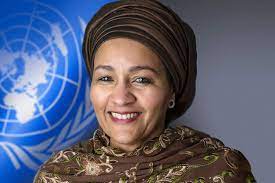The Deputy Secretary General of the United Nations (UN), Dr. Amina Mohammed, has said that Nigeria has a lot to gain from successful implementation of the African Continental Free Trade Area (AfCFTA) in view of the pact’s potential to improve the quality of goods and services and increase the nation’s competitiveness both in national and international markets.
Mohammed made this remark at a High-Level Conversation on Industrialisation and Sustainable Development with the theme ‘Industrialisation A Pathway To Achieving The Sustainable Development Goals’ organised by the Manufacturers Association of Nigeria (MAN).
According to her, inclusive and sustainable industrial development is key to achieving the Sustainable Development Goals (SDGs), which are crucial to attainment of the Nigerian government’s current efforts to achieve sustainable economic growth and creating decent jobs.
She said: “COVID-19 has derailed the progress across all the 17 SDGs in 2020, about 124 million were pushed back to poverty and some 255 million jobs were lost worldwide.
“Therefore sustainable recovery must be guided by the SDGs and the UN stands ready to support Nigeria in harnessing industry and making progress towards the goals”, the UN deputy scribe added.
Mohammed pointed out that manufacturers group’s support would be crucial to ensuring Nigeria records profit in the fourth industrial revolution through the circular economy and efficient use of resources to reach zero waste as called for by SDG 7, 9 and 12 to achieve its 2030 agenda.
In his presentation at the forum, the directing staff, National Institute for Policy and Strategic Studies (NIPSS), Prof. Tunji Olaopa, maintained the need for the Nigerian government to creatively confront and resolve the country’s high consumption culture, particularly of imported goods, in the face of low local production capacity.
The public policy expert also canvassed the need for greater adoption of clean, green and environment-friendly industrial processes reliant on alternative energy sources to save the planet.
He said: “As a country going forward, it means that our entire policy architecture must be redirected towards consumption production discrepancy.
“This means focus on the Local Content Act especially the clauses on value creation, developing of private sector capacity and utilisation of local resources in industrial activities,” he said.
In his remarks at the forum, the Secretary to the Government of the Federation (SGF), Mr. Boss Mustapha, reiterated government’s commitment to protecting the interest of manufacturers for the purposes of increasing the real sector’s contributions to the nation’s GDP.
According to him, there is an intricate link between industrialisation and the 17 SDGs, noting that “global economic recovery from COVID-19 pandemic has taught us the need for reengineering through industrialisation and the government is ready to address issues the sector is faced with so as to record growth not just in Gross Domestic Product (GDP) but in the actual lives of Nigerians.
“To this effect, we are ready to support a green economy, supported by green industries to propel green growth”, the SGF added.
Commenting earlier, the president of MAN, Engr. Mansur Ahmed, explained that the session was organized to examine the nexus between industrialisation and Sustainable Development Goals (SDG) with a view to prioritising them in the nation’s industrial development policies drive.






